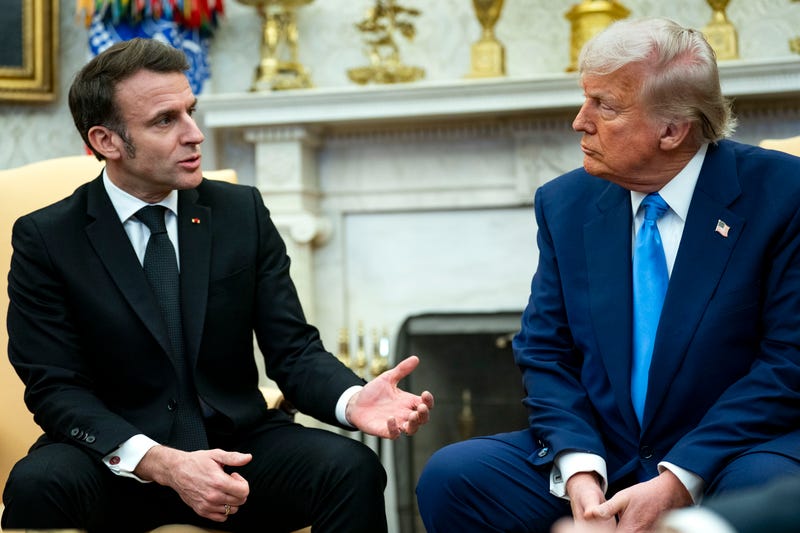
President Donald Trump said he was hopeful that Russia's war in Ukraine was nearing an endgame as he met on Monday with French President Emmanuel Macron on the third anniversary of the invasion. But how the end of the war is coming about is not sitting well with some people, especially Ukrainians and other European country's leaders.
Colonel David Hunt, U.S. Army (Ret.), and an author and Fox News analyst, says he's extremely disappointed with reaction from the Trump Administration, especially their unwillingness to call out Russian aggression in starting the conflict. Last week, President Trump falsely blamed Ukraine for starting the war, before reversing course over the weekend and saying Russia started it.
Hunt says there's no room for whiplash on this.
"We have to remember that this all starts after the Winter Olympics in 2012 or 2013," says Hunt. "Russia invades Crimea, then tries to invade Ukraine in 2014. So they, Ukrainians have been fighting since 2014. I know we all think about the last three years because of the massive size of the attack by the Russians, but there is no, no possibility, no rational human being can discuss Ukraine without saying Russia started this. Russia invaded them. Russia's lost almost 900,000 soldiers. So, it's disappointing at best."
Trump, in broad-ranging comments on the state of the conflict, said he believed Russian President Vladimir Putin would accept European peacekeepers in Ukraine to keep the peace. He also expressed hope that the conflict could end within weeks and that Ukrainian President Volodymyr Zelenskyy would soon come to the U.S. to sign a deal to give the U.S. access to Ukraine's critical minerals to help repay some of the $180 billion in American aid that's been sent to Kyiv since the start of the war.
That's something Hunt says should never happen.
"It's outrageous," explains Col. Hunt. I mean, we are the most important, the biggest country in the world. We are the world leaders, and you can't go around saying, 'look, if I'm gonna help you, you're gonna give me a five to on ratio on feedback, my money back.' I know everyone wants to defend this as the art of the deal. It's embarrassing. I mean, it's absolutely embarrassing.
Hunt adds that the U.S. is not the only country to provide aid for Ukraine.
"We have to be honest about all this," he says. "While the U.S. has given more military aid to Ukraine, yes, the total aid package, Europe has outpaced us. It's not just the U.S. doing this. But you can't have our president telling another country that the aid I gave you, I want it five times back. It makes no sense."
Should Congress have a say in this? Hunt says the clearly need to be a part of the process.
"I don't know where to begin, there's just so many things being thrown against the wall to see if it sticks," Hunt told WCCO's Chad Hartman. "My problem with all this, is Congress is being run over at the same time. So, some of these things have to have some kind of shelf life. It's ridiculous. I don't know what else to say."
“It looks like we’re getting very close,” Trump told reporters at the start of his bilateral meeting with Macron regarding a rare Earth minerals deal with Ukraine. He added that Zelenskyy could potentially visit Washington this week or next to sign the deal.
Trump and Macron earlier on Monday participated in a virtual meeting with fellow Group of Seven leaders to discuss the war.
The talks come at a moment of deep uncertainty about the future of transatlantic relations, with Trump transforming American foreign policy and effectively tuning out European leadership as he looks to quickly end the war in Ukraine.
Ukraine is also looking for future security guarantees as part of any agreement. Trump, however, did not say whether the emerging deal would include American security guarantees.
“Europe is going to make sure nothing happens,” Trump said.
The anniversary — and talks — come at an unnerving moment for much of Europe witnessing a dramatic shift in American foreign policy with Trump's return to power.
Trump also has made demands for territory — Greenland, Canada, Gaza and the Panama Canal — as well as precious rare earth minerals from Ukraine. Just over a month into his second term, the “America First” president has cast an enormous shadow over what veteran U.S. diplomats and former government officials had regarded as America's calming presence of global stability and continuity.
"It makes no sense," Hunt adds. "It's like, I'm going to invade Greenland and Panama, and I want all the rare Earth minerals from Ukraine."
“We have necessity to have guarantees for solid peace,” Macron said at the start of the meeting. “This is very important moment for Europe as well.”
Trump said he also believed Putin would accept European peacekeepers in Ukraine as part of a potential deal to end Russia’s war there.
“Yeah, he will accept it,” Trump said. “I have asked him that question. Look, if we do this deal, he’s not looking for more war."
Despite some notable hiccups, the military, economic and moral power of the United States has dominated the post-World War II era, most notably after the Cold War came to an end with the collapse of the Soviet Union. All of that, some fear, may be lost if Trump gets his way and the U.S. abandons the principles under which the United Nations and numerous other international bodies were founded.
“The only conclusion you can draw is that 80 years of policy in standing up against aggressors has just been blown up without any sort of discussion or reflection,” said Ian Kelly, a U.S. ambassador to Georgia during the Obama and first Trump administration and now a professor at Northwestern University.
